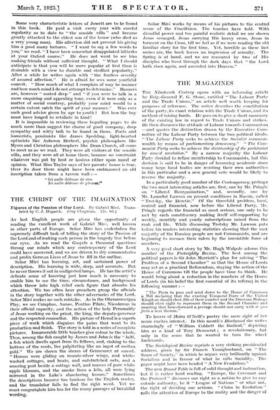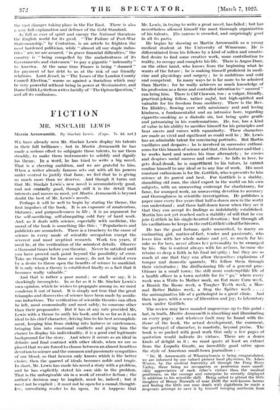THE MAGAZINES
Tim Nineteenth Century opens with an informing article by Brig.-General F. G. Stone, entitled " The Labour Party and the Trade Unions," an article well worth keeping for purposes of reference. The writer describes the constitution of the party, its exact relation with the Trade Unions, and its method of raising funds. He goes onto give a short summary of the existing law in regard to Trade Unions and strikes. He then discusses the attitude of Labour towards Communism —and quotes the distinction drawn by the Executive Com-
mittee of the Labour Party between the two political ideals. " The Labour Party seeks to achieve the Socialist common- wealth by means -of parliamentary democracy." " The Com- munist Party seeks to achieve the dictatorship of the proletariat by armed revolution." By a narrow -majority -the Labour Party decided to refuse membership to 'Communists, but this decision is said to be in danger of becoming academic since -many large local 'bodies are -resisting their own authorities in fhis particular and -a new general vote would be likely to reverse the majority.
In a particularly good number -of the Contemporary, perhaps
the two most interesting articles are, first, one by Mr. Pringle on " Liberal Reorganisation," and, secondly, one by Mr. Lancelot Lawson on present conditions in Russia, called " Trotsky, the Heretic." Of the threefold problem, local, central and financial, now before 'the Liberal Party, Mr. Pringle regards the financial as most serious, one only to be met by each constituency making itself self-supporting by weekly, monthly and yearly subscriptions raised from the rank and file. While discussing Trotsky Mr. Lawson puts
before his-readers interesting statistics showing that the vast majority of the Russian people are -not -Communists, -and are
beginning to menace their rulers 'by the irresistible force of numbers.
A very ,good short.story by Mr. Hugh Walpole adorns this nuniber of the Fortnightly Review. The best -among the political papers is Sir John Marricitt's plan for solving " The Problem of a Second Chamber" so that the -House of Lords may act as a practical Referendum, staying the action of the
House of Commons till the people have time to think. He would bring about a reduction in the numbers of the House of Lords (in his belief the first essential of its reform) in the following manner :-
" The Peers to pass and send down to the House of Commons a Bill declaring that the existing Temporal Peers of the United Kingdom should elect 200 of their number•and the Diocesan Hishops Should elect -eight to represent them -in the -Second Chamber and -enacting that henceforward-a peerage should -not carry with it ipso facto a seat therein."
To lovers of Moira O'Neill's poetry the mere sight-,of -her -name excites interest. In this month's Blackwood .she writes
-charmingly of " William Cobbett the Radical," depicting him as a 'kind of Tory Democrat ; a revolutionary, but only in the sense that he wanted to turn the wheel backwards.
The -Sociological Review reprints a very striking presidential address, given by 'Sir Francis Younghusband, on " The Sense -of Society," in which he -argues very -brilliantly -against Socialism and in favour of what he calls Sociality. The paper might have been headed " A New Feudalism."
The new Round Table is full of solid thmight and instruction, -but it is rather hard reading. "Europe, the Covenant and the Protocol " discusses our right as -a nation to give to any outside -authority, be it " League of Nations " or what not, the right of deciding our actions. " China in Evolution " calls the attention of Europe to the reality and the danger -of the vast changes taking place in the Far East. There is also a very full explanation and defence of the Gold Standard.
As full as ever of spirit and energy the National threatens the English world for its good. "-The Failure of Post-War Statesmanship," by Centurion, is an article to frighten the most hardened politician, while " almost all our staple indus- tries" are, we are assured, " in grave financial difficulties," the country is " being compelled by the maladroitness of its Governments and statesmen" to pay a gigantic " indemnity" to America. At the same time France is being " dunned " for payment of her debt to us at the risk of our friendly relations. Lord Jessel, in " The Issues of the London County Council Election," warns- us against- a Socialism which may be very powerful without being in power at Westminster, and Dame Edith Lyttelton writes lucidly of The Opium Question," and all its confusions.



























































 Previous page
Previous page